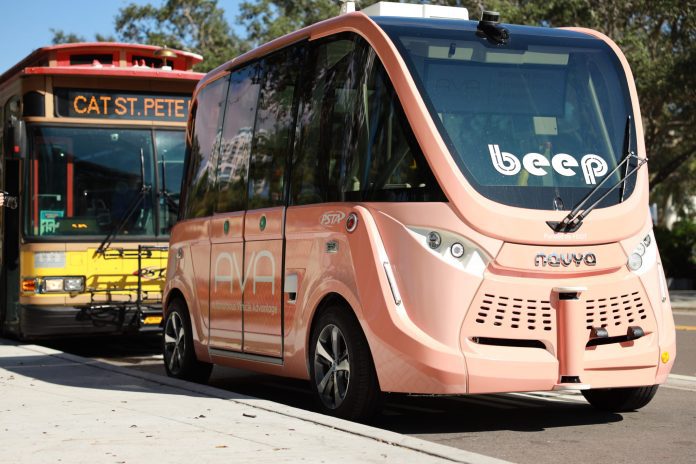The Atlanta suburb of Peachtree Corners in the US, playing home to a live smart city testbed, is working with T-Mobile to launch a new fleet of 5G-powered autonomous shuttles for local residents. The service is being provided by mobility solutions provider Beep, with electric shuttles from manufacturers Navya and Local Motors; the latter is providing a 3D-printed autonomous vehicle for the scheme.
The system, running low-latency comms between vehicles and road infrastructure, relies on so-called cellular vehicle-to-everything (C-V2X) connectivity, based on T-Mobile’s public 5G network, reinforced with local edge compute functions in an integrated (or intelligent?) transport system (ITS). The new fleet goes by the name PAUL (for Piloting Autonomous Use Locally), and offers Level 4 and 5 autonomy, offering high and full self-driving.
In February, Peachtree Corners said automaker Ford was testing Level 3 vehicles, based on an open-source platform, for smart-city developers to try out new mobility technologies on public roads. The Ford effort, based on its Ford Edge platform, was designed to “interact with local residents”. Level-3 autonomy means the vehicle has the potential to drive itself in certain circumstances, where it will assume control of all safety-critical functions.
The latest Level 4 and 5 tests with Beep employ various emerging technologies connected over 5G, such as real-time video analytics in roadside and onboard units (RSU and OBU) at intersections and in the shuttles. Beep is providing ‘command center’ (BCC) capabilities to manage traffic. Cloud provider OVHcloud is providing compute, storage, and other cloud platform resources.
Each shuttle is equipped with a 5G gateway to capture, issue, and process various telematics data, and to communicate with other vehicles and road users, and with sundry traffic lights and intersections. Emergency communications with law enforcement and healthcare, and blue light services, are being enabled. The 3D-printed vehicle from Local Motors is called Olli, and pictured below.

Peachtree Corners is home to the Curiosity Lab smart city project, funded by the city and federal grants, which includes a 1.5-mile test and demo track for autonomous vehicles and a glut of smart city pilots on a 500-acre technology park. The test track is also a public road, with a three-mile loop with ready V2X infrastructure.
The new shuttle service – the latest in a long stream of C-V2X trials with semi-autonomous and autonomous vehicles – will pass seven stops along the three-mile Technology Parkway route, part of Curiosity Lab campus, stopping at Hampton Inn, City Hall, Technology Parkway (South), Innovation Center, Research Drive, and Anderby. The route takes in hotels, restaurants, retail shops, the Innovation Center at Curiosity Lab, and City Hall. Additional routes may be added in other areas of the city, said Peachtree Corners.
Brian Johnson, city manager at Peachtree Corners, said: “We’ve made it our mission to create the city street of the future in the most differentiated smart city environment in North America – and with Beep launching the new PAUL autonomous shuttle service, we’re continuing to break new ground. This deployment not only allows for the continued development and deployment of safe, enjoyable and eco-friendly transportation options – but it also allows a true mobility-as-a-service pioneer to leverage our city-owned V2X infrastructure and vibrant ecosystem to help accelerate new technology development that further enhances safety and earns critical trust from the public.”
Joe Moye, chief executive at Beep, said: “The city will immediately benefit from our experience in having run the largest and most tenured autonomous service in the country in Florida, as well as unique deployments like Yellowstone National Park. We’re excited to leverage the city’s advanced cellular-V2X technology, 5G, and more smart city infrastructure to enable deeper learnings, to analyze vehicle data and to develop new proprietary technologies that advance true Level 4 and 5 autonomous service in the real world – while also working with government to help evolve policy and regulation alongside the technology.”
Dave Bezzant, vice president for government at T-Mobile USA, said: “The vision of 5G powering the city street of the future is happening now at Peachtree Corners where people, vehicles and infrastructure all communicate with each other to elevate safety and improve everyday life. Today, Beep’s autonomous shuttles allow all parties to accelerate the development of solutions leveraging our 5G network such as vehicle operation management for vehicle health monitoring, safety features including real-time alerts and in-vehicle entertainment.”

